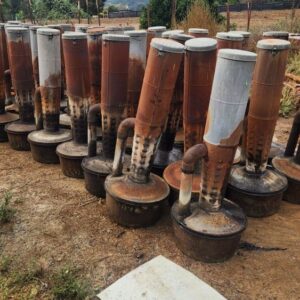Huge Evacuation in Cologne as Experts Safely Remove World War II Bombs
Recently, the German city of Cologne faced a major safety operation when three unexploded bombs from World War II were found in a shipyard in the Deutz area. Because these bombs were still dangerous, authorities had to evacuate more than 20,000 people from their homes, workplaces, schools, and hospitals to make sure everyone was safe while the bombs were being defused.
This was one of the biggest evacuations in Cologne since World War II itself. The bomb squad worked carefully to deactivate these large, old bombs, which had been buried underground since the war but could still explode if not handled properly. The operation took place on a Wednesday after the bombs were first discovered two days earlier, on Monday.

What Happened in Cologne?
Cologne is a large city in Germany with a rich history, but it was heavily bombed during World War II. Many bombs were dropped during that time, and some didn’t explode right away. These bombs, called unexploded ordnance, can still be dangerous today, even many decades later.
On Monday, workers found three large American bombs buried in a shipyard in Deutz, a busy neighborhood on the east side of the city. Because these bombs posed a serious threat, the city officials had to act fast.
They set up a safety zone of about 10,000 square meters (that’s roughly 107,000 square feet), and everyone within that area had to leave immediately. This included people living in homes, workers in shops and offices, students and teachers at schools, patients and staff at a large hospital, and travelers at a major train station nearby.
The Evacuation Process
Evacuating over 20,000 people was a huge task. Officials and police went door to door to inform residents about the evacuation. They explained how important it was to leave their homes for their own safety. Authorities were clear that anyone refusing to evacuate could be forced to leave by police, and those who didn’t cooperate might face fines.
Some people found the evacuation difficult. For example, fifteen couples who had planned to get married that day at Cologne’s historic town hall had their weddings moved to a different location because of the evacuation.
Emergency services help the most vulnerable people. For example, some patients from the intensive care unit of Eduardus Hospital were moved carefully by ambulance to safe places.
The city also set up two special centers for people who had nowhere to stay during the evacuation. Officials reminded everyone to bring their ID cards, any medicine they needed, and to take care of their pets.
What Was Closed During the Evacuation?
During the evacuation, many usual activities in the city stopped for the day. Shops, restaurants, and offices in the area are all closed to keep everyone safe. Important cultural places like the Philharmonic Hall and several museums also shut down temporarily.
Schools in the area were closed, affecting many children and their families. Hotels and government buildings in the zone were empty as well.
Transportation was heavily affected. All roads inside the safety zone were closed to traffic. Trains passing through the Messe/Deutz station were canceled, and the station itself was shut down for the day. This caused delays and cancellations for many travelers.
The Bomb Defusal
Once everyone was safely away, the bomb disposal experts started their work. Defusing bombs from World War II is a delicate and risky process. The explosives inside can still detonate if disturbed incorrectly, so it requires skilled technicians.
The team carefully disabled all three bombs over several hours. After making sure the bombs were safe, the city officials allowed people to return to their homes and workplaces.
Why Are WWII Bombs Still a Problem?
Germany was heavily bombed during World War II, and many bombs were dropped on cities like Cologne and Berlin. Even though the war ended over 75 years ago, it’s not unusual for construction workers or city officials to find unexploded bombs when digging underground.
These bombs can still be dangerous because their explosives remain active. That’s why the authorities treat every discovery seriously and take precautions like evacuations and bomb disposal.
How Often Do These Bombs Appear?
Unexploded bombs from World War II are found surprisingly often in Germany. Every year, dozens of bombs are discovered during construction projects or roadworks. Sometimes, whole neighborhoods have to be evacuated, just like in Cologne.
For example, Berlin, another heavily bombed city, regularly faces similar evacuations. These discoveries remind people how the effects of war can last for generations.
The German government has special bomb disposal teams who are trained to handle these situations quickly and safely. Their work is vital to keeping cities safe.
What Should Residents Do in These Situations?
If you live in or visit cities with WWII history like Cologne, it’s important to follow instructions from emergency services if a bomb is found.
- Leave the area immediately when told to evacuate.
- Bring only what you need — ID, medication, and essential items.
- Listen to official announcements and avoid the danger zone.
- Take care of pets and family members.
- Stay calm and cooperate with authorities.
Authorities usually provide shelters and support centers to help evacuees. They will also inform residents when it is safe to return.
The Emotional Impact
For many residents, such evacuations can be stressful and frightening. Suddenly having to leave your home with little notice, and worrying about your belongings, your family, and your pets is not easy.
In addition, regular daily life is disrupted. Children miss school, adults miss work, and local businesses have to close.
The city and emergency services try to make this process as smooth as possible. Still, it can be a difficult day for many. The cooperation and patience of the community are essential for safety.

The Bigger Picture: Remembering History
These bombs are a powerful reminder of history. More than 75 years after the end of World War II, they show how the past can still affect the present.
Many people in Cologne and other German cities have family stories about the war, and these bombs connect the city to that history in a very real way.
The fact that these bombs are still found reminds us of the importance of peace and safety in our time. It also shows the value of the work done by bomb disposal teams who protect communities from hidden dangers.
Conclusion
The safe defusing of these WWII bombs in Cologne shows how important it is to take historical dangers seriously, even many decades after a conflict ends. Thanks to the quick action of emergency teams and the cooperation of thousands of residents, this large-scale evacuation went smoothly without injuries.
Cologne will continue to be vigilant because unexploded bombs are still sometimes discovered during construction or city projects. Safety remains a top priority.
If you’re interested in more updates about safety and community news, stay tuned to local sources and always follow official guidance during emergencies.
Note
This article is for information only. It’s important to follow advice from local authorities and experts in any emergency situation.






